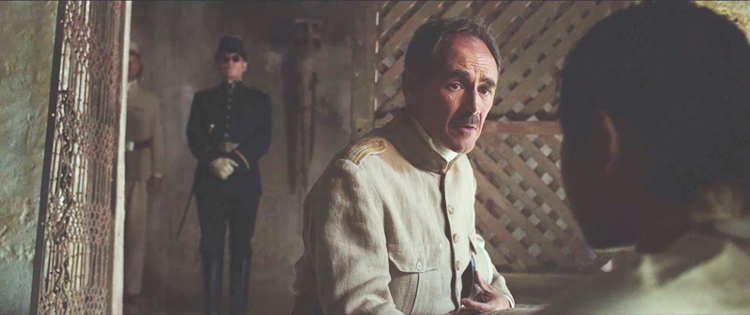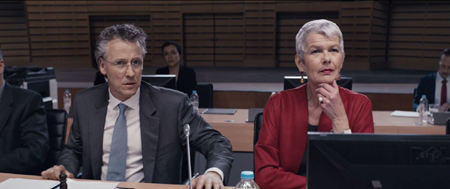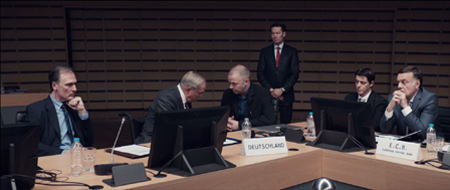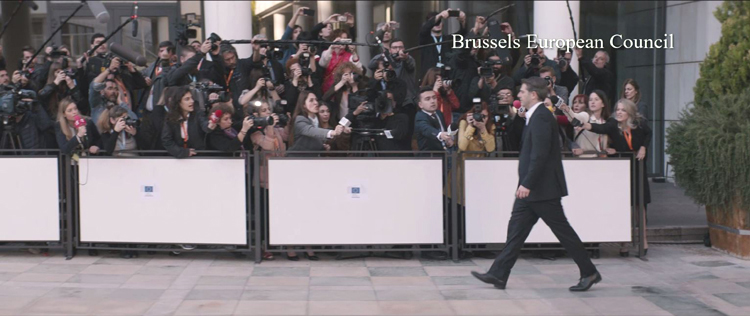Venice 2019: Political dramas, allegorical and real-life
Monday | September 16, 2019 open printable version
open printable version
Waiting for the Barbarians (2019).
Kristin here:
The 76th Venice International Film Festival is over, but I have two films yet to blog about. This will be our final entry. Soon we’re both off to the other VIFF, the Vancouver International Film Festival, from which we will of course be blogging.
Waiting for the Barbarians
I was particularly looking forward to this film, since I admire Ciro Guerra’s two previous features, Embrace of the Serpent (2015) and Birds of Passage (2018). It was rather surprising that Guerra should have a new film premiering only a year after Birds of Passage, especially since both are in their own ways epics in relation to most other art films. The fact that it stars the great stage and screen actor Mark Rylance was another factor in its favor.
Oddly enough, the morning press screenings and evening red-carpet screening of Waiting for the Barbarians were relegated to the penultimate day of the festival, Friday, September 6. It was the last of the films in competition to be shown, with The Burnt Orange Heresy (in the festival’s Fuori Concorso thread) the closing film on Saturday. By that point, quite a few of the foreign-press members had departed for Toronto or elsewhere. The Friday afternoon press conference, despite including Johnny Depp on the panel (above), was SRO, but there was no immense queue to get and and very few standing at the sides or sitting on the central stairs, as usually happens when big stars are present.
Overall the film has received lukewarm reviews, with a few more praising pieces mixed in. Both David and I, however, found it riveting. It deals with the unnamed Magistrate (Rylance), who rules a fort community on the border of a desert landscape inhabited by nomadic tribes. The Magistrate controls the place with a loose rein, meting out mild punishments for what he perceives as minor infractions by the local population. He seems content, excavating for ancient wooden rods inscribed with undeciphered texts and apparently has a relationship with a sympathetic local prostitute. He seems friendly with the people under his care and has taken the trouble to learn their language.
The countries which this border area separate are never identified and are clearly fictional places serving to portray the horrors of colonial domination by western nations. Clearly the white officials and soldiers in the film are not intended to be British. The flags on display bear no resemblance to the Union Jack and the costumes are not British. The local nomads speak Mongolian, and the main female character, referred to only as “the Girl,” is played by Gana Bayarsaiknan, a Mongolian performer.
The conflict is set moving by the arrival of Colonel Joll, an ominous figure in black, sporting bizarre dark glasses with frames of twisted wire (in the background of the frame at the top). His suggestion that he will use “pressure” to force the locals to confess their crimes turns out to be a considerable understatement. Joll ventures a little way into the the territory of those he calls “the barbarians.” He claims to turn up evidence that the local people are plotting to attack the colonial forces along the border. He has discovered this evidence though torture.
Much more description would provide too many spoilers. In general, the Magistrate tries to reason Joll and his confederates out of their plans. He also frees prisoners and nurses the native girl, who has also been tortured, back to a semblance of health. Eventually he finds himself driven to rebellion.
The film, with exteriors shot in Morocco, creates a vivid sense of a fortress community isolated from the world, and the cinematography as the Magistrate leads a small group to try and return the Girl to her people is austerely beautiful.
So far all the release dates for Waiting for the Barbarians are for festivals, including the London Film Festival. Whether it will be released in the US, as Guerra’s two previous films were, is unknown. I would suggest giving it a chance, despite some lackluster reviews. It’s another film that would lose much of its effect when streamed on a small screen.
Adults in the Room
Each year a small number of celebrities receive special awards, essentially salutes to long and fruitful careers. This year the main honors went to Pedro Almodóvar, Julie Andrews, and Costa-Gavras. We didn’t catch the awards ceremonies themselves, and the Amodóvar and Andrews ceremonies were followed by classic films of their past (Women on the Verge of a Nervous Breakdown and Victor Victoria respectively). Costa-Gavras’ career started as an assistant director to René Clair, René Clément, Henri Verneuil, Jacques Demy, Marcel Ophüls, Jean Giono, and Jean Becker before beginning to direct on his own. Apart from his numerous features, perhaps most notably Z (1969), he has been president of the Cinémathèque Française since 2007.
Now, at age 86, he brought with him a new feature, Adults in the Room, a dramatization of the tensions and strategies of the politicians and diplomats struggling to find a solution to the Greek financial crisis.
As in most such films, the actors have been chosen for their resemblance to the historical figures. In the upper of the two images below, for example, Josiane Pinson plays Christine Lagarde, head of the IMF, and Daan Schuurmans is Jeroen Dijsselbloemm, president of the Eurogroup.
The film begins with the unlikely election of a leftist government in Greece (the Coalition of the Radical Left, or Syriza) in January of 2015. The film sticks largely to the point of view of Yanis Varaufakis, the fiercely dogged Finance Minister. His memoirs of the struggle to refinance Greece’s overwhelming debt and to keep Greece from being expelled from the European Union were the basis for the script by Costa-Gavras.
Remarkably, Costa-Gavras follows the events through an almost unbroken series of conversation scenes. These center on clashes between Varaufakis and Greece’s Prime Minister, Alexis Tsipras, and on stormy meetings involving representatives of the Eurogroup and the infamous “Troika” (the European Commission, the European Central Bank, and the International Monetary Fund). The Troika faction, which had bailed out the Greeks and insisted on disastrous austerity measures, absolutely refuses Greece’s demand that the loans stop and that the debt be devalued to a viable level.
This does not begin to convey the complexity of the Greek crisis, but Costa-Gavras manages to create suspense, whether or not we can actually follow exactly what is going on. There are moments when Varaufakis’ negotiation strategies are withheld from us, and we are as puzzled as the officials watching them from across the room, as in this glance-POV cut:
These meetings are linked primarily by shots establishing the various cities in which these complex and fruitless meetings take place. Often superimposed titles reveal the locations, as when the Greek Prime Minister arrives in Brussels for one such meeting (see bottom).
By the end we are not left with a thorough grasp of the intricacies of these events, which would hardly be possible for a crisis that started around 2009 and is still going on. Still, we gain a somewhat better understanding than we are likely to have on the basis of news stories stretched sporadically over over so many years. We are also left indignant at the determination of the Troika to persist in the very policies that drove Greece deeper and deeper into debt. Some have found the film tedious in its intense focus on meetings and strategies. Others I talked to after the press screenings found it fascinating. Certainly the film and its source book have chosen the brief period of the crisis (about six months) that shows most clearly and dramatically what Greece faced from the rest of the EU and why its crisis still has not ended.
For one final time this year, thanks to Paolo Baratta and Alberto Barbera for another fine festival, and to Peter Cowie for his invitation to participate in the College Cinema program. We also appreciate the kind assistance of Michela Lazzarin and Jasna Zoranovich for helping us before and during our stay.
Adults in the Room (2019).


















